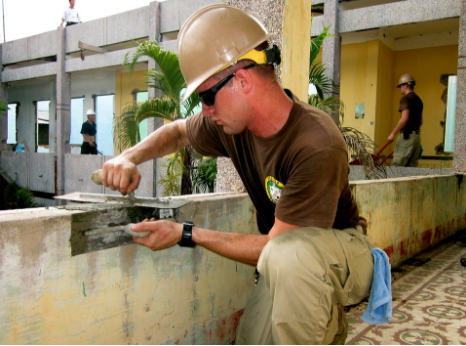8 Tips to Building Trust in Your New Construction Firm

These are uncertain and worrying times for any nascent business. If you’re trying to make a name for yourself, your trust is of paramount importance.
At a time when consumers have more demands than ever on their finances, they can be extremely slow to trust unknown commodities like new businesses. Even if those businesses are deeply committed to excellence and have invested heavily in infrastructure to provide it.
At a time when consumer confidence is at its lowest in years, you may feel as though you’ve picked the worst possible time to go into business for yourself.
But as hard as it may seem, trust can and will be won, and your business will gain the reputation it needs to chart a path to sustainable growth. And as other firms pick up their tools across the country, you’ll need to do all that you can to stand out amidst the fierce competition.
A little trust goes a long way in the construction industry. Traditionally a high-cost, low-margin business, contractors need to maintain a steady flow of work in order to keep themselves afloat.
And like any small business, they survive, thrive, live or die by the strength of their reputation. Here we’ll look at some ways in which nascent construction firms like yours can build lasting trust among clients and build the kind of reputation that inspires trust and confidence.
#1 The importance of trust
Trust is extraordinarily important for construction professionals. After all, your clients entrust you with their homes. Something in which they not only have a significant monetary investment but a huge emotional attachment.
Entrusting their home to a construction firm or contractor is like entrusting their children to a teacher. Something that they can only do when they feel like you have their trust.
And in an era where the construction industry is arguably more fragile than ever, trust is more important than ever. A recent report, Trust Matters: The High Cost of Low Trust” surveyed over 2,500 construction industry professionals all over the world.
The report details the benefits of trust in the industry and the costs associated with building it, compared to the cost and opportunity loss that comes with losing it.
The report found that 93% of construction professionals reported above-average levels of trust within their organization. However, only 37% achieved very high levels of trust.
It’s a small distinction that can make a big difference. Most clients are slow to trust construction companies, and when they find one that they genuinely trust, they tend to recommend them to friends, family members, and co-workers. It’s an industry that thrives on referrals.
And average or even above-average levels of trust may not be enough to secure enthusiastic referrals from clients.
#2 Why are people slow to trust construction workers?
The unfortunate truth is that construction firms and contractors are still battling against decades-old stereotypes. TV shows and blogs are all-too keen to espouse horror stories about “builders from Hell” and perpetuate the image of the double-dealing, shortcut-taking, over-charging contractor.
Furthermore, construction companies are like auto repair shops….Nobody really wants to spend their money on them. They spend it grudgingly and with the sneaking suspicion that they’re being swindled somehow.
They’re spending either because something needs to be repaired or because they’re making an investment in their future. But in either case, there are likely things that they’d rather spend their money on.
As such, it can be extremely difficult to engender trust in new clients, even when you’re doing everything right.
Still, a little empathy can be extremely valuable. It can inform your approach so that you position yourself to be as appealing as possible and start earning the client’s trust from the moment they’re first exposed to your brand…
#3 Communicate clearly, openly and honestly
Clear communication is the key to success in any business. But it’s especially important in businesses like construction, where you may need to communicate highly technical information to clients who are not technically minded.
There’s a fine line to be walked here. You need to be able to keep the client well informed in as much detail as possible, without relying heavily on technical / industry jargon. And that’s a discrete skill that you’ll need to develop as quickly as possible.
You need to be able to manage the client’s expectations effectively. In your zeal to make a good impression as quickly as possible, it can be all too tempting to over-promise to secure a commitment from the client. But this will inevitably lead to broken promises, dissatisfaction and a black mark against your burgeoning reputation.
If a potential client’s expectations are unrealistic, it’s essential to manage them as early in the process as possible, and mitigate them by providing a realistic framework for how you can help them achieve their goals.
#4 Offer free, zero-obligation quotes
This is something that every construction professional should offer. And while most of them do, not all of them mention it explicitly on their websites and social media profiles. A rookie mistake that could cost them business.
New clients need to feel as though they’re in the driver’s seat. And that starts by reassuring them that they’re making an informed choice based on relevant information.
A quote that is free of charge, comprehensive, and completely free of obligation can start your working relationship off in the best possible way, with them feeling confident, assured, and in control.
#5 Partner with trustworthy suppliers
If you’ve started up your own construction business, you’ve likely already built up relationships with good suppliers. But in your efforts to earn the loyalty of prospective clients, you need to remain flexible in terms of which suppliers you’re willing to work with.
Every construction firm should have a clear set of expectations when it comes to choosing their suppliers. They should be flexible and responsive, with the reach and network needed to get the supplies that are unique to the demands of each project.
By all means, expand your network of suppliers in order to provide a better deal to the client. Just make sure that you do your due diligence with each new one you affiliate with.
Whether you’re dealing in sealant or soffits, manifolds, or manhole covers, you need to ensure that every piece of material you use reflects the quality you want to associate with your company.
Remember that you’re building a brand, and whatever claims you make about yourself and your values, clients will expect to see the same quality and values in every link of your supply chain.
Which brings us to…
 #6 Show your commitment to sustainability and ethics
#6 Show your commitment to sustainability and ethics
We live in an age where consumers are better informed than ever. They are motivated not only by quality and value for money but ethics and sustainability.
They are more aware than ever of the impact that their consumer choices can have on the environment and the communities that work hard to source the materials that go into the products they consume.
Many consumers, especially millennial consumers, are keen to deal exclusively with brands that have a clear focus on ethics and sustainability.
This means that you’ll have to demonstrate a degree of “green cred” if you want to engage this generation of affluent young professionals.
Using energy-efficient methods, sustainably sourced and renewable supplies, dealing with waste responsibly, and repurposing materials wherever possible can all help you to fly the flag for sustainability, while opting to go the extra mile and investing in things like Queensland soil stabilisation (or elsewhere more relevant) will not only help to protect your developments but also tangibly reduce their environmental impact.
Making sure that your team is well looked after and well-compensated will also help to demonstrate your commitment to operating ethically.
#7 Incentivize social proof… even for the smallest jobs
Your digital marketing, your website copy, your social media feed. These are all useful tools that can help you to make the perfect first impression with prospective clients.
But let’s be honest. They’re always going to take anything you say about yourself with a pinch of salt. They’re far more likely to trust the word of other clients who are happy with the services you’ve provided.
So any social proof you can gather, even for the smallest jobs, can help you to earn the trust of new prospects.
Incentivize previous clients to leave five-star reviews and testimonials on your Google My Business Page, Trustpilot, Yelp, and other relevant sites. Don’t forget to display these front and center along with images of work that you’ve already carried out.
Never underestimate the power of using your website to make a great first impression before you arrive at the client’s home to provide a quote.
#8 Share their passion and enthusiasm
Finally, some clients will want to hire you for repair and maintenance jobs. But some will entrust you with bigger and more exciting renovations.
These clients are much more energized and enthuses, and you should do all that you can to match their passion and enthusiasm. Of course, you’ll also need to keep their expectations realistic, but a little excitement can go a long way in assuring them that you’re the right contractor for them.
Client trust can be hard-won. But it will prove to be the foundation on which you build your fledgling construction firm’s reputation and sustainable success.






